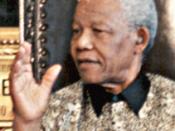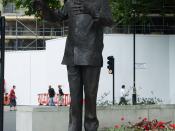Mandela
Earlier days
Nelson Mandela was important in both long and short term, internal and external factors towards ending apartheid. I will begin with Mandela's earlier participation against the oppressive apartheid system. There were many active and successful anti apartheid movements such as the freedom charter, protests against the pass laws, the programme of action, the youth league, UDF, federation of south African women, and many more. Mandela was deeply involved in many of these examples, and throughout the years his personality and reputation grew stronger and finally in his years in prison he became a symbol of anti apartheid movement. His strong charisma and diligent personality was enhanced especially earlier in the youth league and the freedom charter.
Nelson Mandela, Oliver Tambo, and Walter Sisulu ran and were the main participants in the youth league of 1944. The aims of the youth league were to reject racial segregation, and to administrate the Africans into the full citizenship of the country so that they would have direct representation in parliament on a democratic basis, to work independently of whites and so forth.
The youth movement grew in support, and became a long-term internal factor to the ending of apartheid. It was a long-term factor, because it created social and political difficulties seeing as the awareness of dissatisfaction grew, and the goals were implicated over and over again in the following years. Focusing on the main question, and my overall opinion, the freedom charter and the youth league contribute as evidence towards my opinion that Mandela was important in the ending of the apartheid, however he was only one of the many people and groups that were substantially significant in the ending of oppression. Despite Mandela only being a part of the youth movement, his input was essential. Had...


